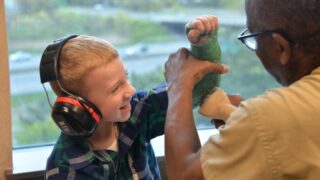Trauma Care & Education
About Us
The Albany Med Health System Trauma Program serves a 17-county area of northeastern New York and is part of a network of over 400 emergency medical service provider organizations, 25 non-trauma center hospitals and two Level III trauma centers. As the region's only Level I trauma center, Albany Medical Center is the lead organization responsible for overseeing the activities of the regional trauma system.
Our trauma team is also responsible for identifying practices and opportunities to ensure the accessibility, quality, and highest level of trauma care for patients across our region. Part of this work involves the coordination of community and professional education programs including injury prevention and outreach efforts.
More than 7,250 New Yorkers die each year because of injury. Injuries occur in predictable patterns, with recognizable risk factors, and among identifiable populations. We keep track of where, to whom, and why injuries occur across the region and use this information to develop injury prevention programs.
For more information about our injury prevention programs, contact the Trauma Education Outreach and Injury Prevention Coordinator at 518-262-1203, 518-262-5141 or [email protected].
Current Injury Prevention Initiatives at Albany Medical Center
A part of Safe Kids USA, is a coalition of public and private organizations working together to prevent injuries to children.
- The Child Passenger Safety Certification Training Program, certifies people as child passenger safety technicians and instructors. We conduct child safety seat checks, where parents and caregivers receive hands-on assistance with proper use of child restraint systems and safety belts.
- Safe Kids Buckle Up, which offers parents and caregivers hands-on instruction about safety inside the car (including information on car seats, booster seats and seat belts) as well as around the car (featuring the Spot the Tot program).
- Capital Region Safety Seat Inspection Stations. These locations are available through emergency response agencies, community organizations and more. To find a location near you, call 518-262-5141.
- Education surrounding car seat recommendations for children.
Screening, Brief Intervention, and Referral to Treatment (SBIRT)
SBIRT is a comprehensive, integrated, public health approach to the delivery of early intervention and treatment services for persons with substance use disorders, as well as those who are at risk of developing these disorders. Primary care centers, hospital emergency rooms, trauma centers, and other community settings provide opportunities for early intervention with at-risk substance users before more severe consequences occur. SBIRT at Albany Medical Center includes:
- Screening which quickly assesses the severity of substance use and identifies the appropriate level of treatment.
- Brief intervention focuses on increasing insight and awareness regarding substance use and motivation toward behavioral change.
- Referral to treatment provides those identified as needing more extensive treatment with access to specialty care.
New York State Injury Community Planning Group (ICPG)
Albany Medical Center’s Injury Prevention Coordinator participates as a member of the New York State Department of Health Injury Community Planning Group. The goal is to decrease the burden of injuries in the state and enhance statewide injury and violence program infrastructure. The ICPG is a work group dedicated to building a stronger infrastructure and a safer New York.
Fall Prevention
Falls are the leading cause of fatal and non-fatal injuries for older Americans, resulting in more than 2.5 million injuries treated in emergency departments annually, including over 734,000 hospitalizations and more than 21,700 deaths.
Falling threaten seniors' safety and independence as well as generate enormous economic and personal costs. However, falling is not an inevitable result of aging. Through practical lifestyle adjustments, falls prevention programs, and clinical-community partnerships, falls among seniors can be substantially reduced.
Follow these recommendations to help prevent falls, and use this checklist to make sure you stay safe.
American College of Surgeons - Advanced Trauma Life Support (ATLS)
The Advanced Trauma Life Support course teaches a systematic, concise approach to the early care of the trauma patient.
Emergency Neurological Life Support (ENLS)
The Emergency Neurological Life Support (ENLS) course is designed to help health care professionals improve patient care and outcomes during the critical first hours of a patient’s neurological emergency. Now in its fourth version, ENLS demonstrates a collaborative, multi-disciplinary approach and provides a consistent set of protocols, practical checklists, decision points, and suggested communication to use during patient management.
Emergency Nurses Association (ENA) - Trauma Nursing Core Course (TNCC)
ENA developed and implemented the Trauma Nursing Core Course (TNCC) for national and international dissemination as a means of identifying a standardized body of trauma nursing knowledge. The TNCC (Provider) is a two day course designed to provide the learner with cognitive knowledge and psychomotor skills. The purpose of TNCC is to present core-level knowledge, refine skills and build a firm foundation in trauma nursing.
Advanced Burn Life Support Now
ABLS Now is designed to provide fire fighters, EMTs, paramedics, licensed practical nurses, nurses, nurse practitioners, therapists, physicians assistants, and physicians with the ability to assess and stabilize patients with serious burns during the first critical hours following injury and to identify those patients requiring transfer to a burn center. The course is not designed to teach comprehensive burn care, but rather to provide information that will enable those who only rarely treat burn patients to provide the care needed by a burn patient in the first 24 hours after injury. Contact Jenette White at 518-262-1070 or [email protected] to learn more.
Adirondack-Appalachian Regional EMS (AAREMS)Adirondack Medical Center
Albany Medical Center
Albany Memorial Hospital
Albany Stratton VA Medical Center
Alice Hyde Medical Center
A.O. Fox Hospital
Bassett Medical Center
Center for Donation and Transplant
Champlain Valley Physicians Hospital (CVPH)
Cobleskill Regional Hospital
Columbia Memorial Health
Delaware Valley Hospital
Elizabethtown Community Hospital
Elizabethtown Community Hospital Ticonderoga Campus
Ellis Hospital
Glens Falls Hospital
Margaretville Hospital
Nathan Littauer Hospital
O'Connor Hospital
Regional Emergency Medical Organization (REMO)
Regional Training Center at Albany Med
St. Mary's Hospital
St. Peter's Hospital
Samaritan Hospital
Saratoga Hospital
New York State Trauma Program
State Trauma Advisory Committee



